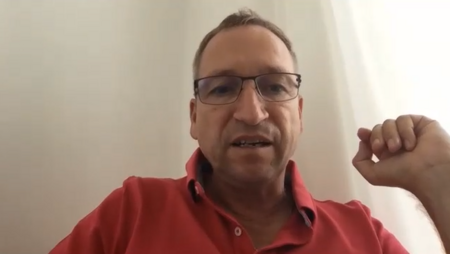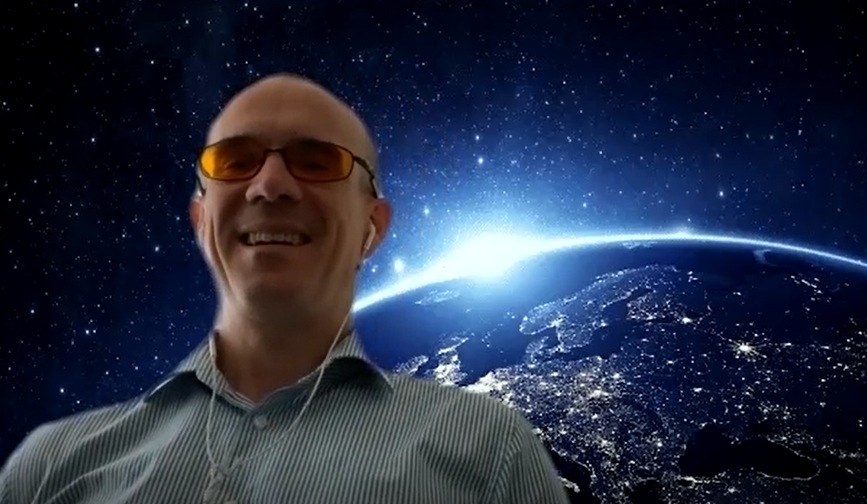Next stop Singapore: Forging partnerships in the midst of a pandemic
Professor Dr. Falk Müller-Riemenschneider lives and works in Singapore. As an Associate Professor at the School of Public Health at the National University of Singapore (NUS), he specializes in broad-based studies on the health of the population. He is particularly focused on the prevention of major illnesses faced by the current population, such as cardiovascular disease and diabetes. What role do lifestyle factors play in this regard? This is the question he intends to answer with the help of digital technologies. Since 2019, he has regularly traveled to Berlin as a BIH Visiting Professor, funded by Stiftung Charité. Together with his host, Professor Dr. Roland Eils, Professor of Digital Medicine at BIH, he has established a partnership between the NUS, BIH and Charité in the field of personalized digital medicine. However, this development occurred prior to the hindrances posed by the SARS-CoV-2 virus. Since then, Müller-Riemenschneider has remained in Berlin for longer than planned as the Covid-19 pandemic has made it difficult for him to return to Singapore. We met with him and Professor Dr. Eils via a video meeting in August 2020 to discuss the impact of the pandemic on their daily work.
Professor Müller-Riemenschneider, Professor Eils, everyone’s work routines have been upended in recent months. How has the pandemic affected your joint project, which is crucial for the exchange between Berlin and Singapore?
Müller-Riemenschneider: Our partnership had already come relatively far prior to the lockdown. Dr. Eils and I are both very interested in the application of mobile technologies for personalized medical care. With the funding provided by Stiftung Charité, we had planned to bring the partnership between Charité, BIH and the National University of Singapore (NUS) to an institutional level. Fascinating and renowned research is taking place at these institutes, and there is a clear interest from all parties involved. The preliminary talks and work meetings we held in Berlin and Singapore with the respective management levels were extremely promising and we had already identified other cooperation partners from Berlin and Singapore who could work together in workshops, for instance. The fact that the NUS recently became an official strategic partner of the Berlin University Alliance [the excellence network of the three Berlin universities and Charité, editor’s note] made things even more interesting. Then the pandemic hit. Unfortunately, further organization has been on hold since then.
Eils: My trip to Singapore to visit Dr. Müller-Riemenschneider in February was the last business trip I made abroad. Since then, I’ve been working primarily from home in Germany. We had already established some very promising approaches for the partnership, but the pandemic caught us off guard.
Which changes or challenges have you otherwise experienced in your work as a scientist?

Funding program
BIH Visiting Professors
Funding period
2019 to 2022
Project title
From real-time monitoring to personalized digital interventions
Research areas
Public Health, Digital Health
Institution
Berlin Institute for Health (BIH)
Since 2018
Associate Professor, National University of Singapore
2012 – 2018
Assistant Professor, National University of Singapore
2005 – 2016
Various positions (incl. Postdoctoral Research Fellow, Teaching Coordinator, Senior Scientist) at the Institute for Social Medicine at the Charité - Universitätsmedizin Berlin
Müller-Riemenschneider: With regards to scientific work, my team and I have been very limited. Our projects in Singapore are typically large-scale research projects with thousands of study participants, who we invite to our research centers to undertake research. We then investigate risk factors or proactive factors for certain widespread diseases on the basis of the findings of our research. These findings enable us to develop programs to promote health. As a result of the pandemic, we were prevented from inviting study participants, the fundamental basis of our research. Only recently has this once again become a possibility under special hygiene requirements. This has set us back considerably.
Eils: On a scientific level, the pandemic caused me to shift my research slightly towards SARS-CoV-2.
That’s interesting. What precisely did you get involved with in current corona research?
I’m actually a cancer researcher and specialize in the human lung. This has enabled me to gain extensive experience in the research of the pathophysiology of this organ, which has proven incredibly useful for Covid-19 research. We studied our Covid-19 patients at the Charité hospital and, within the scope of the PA Covid-19 platform (https://studycenter.charite.de/covid_19/), looked at which decisive factors may lead to a light or severe progression of illness for the patient. We were able to establish how the immune system overreacts in patients who experience a severe course of illness. Our research findings have initiated a range of clinical studies in the USA, which we are very pleased about on a scientific level. We would have liked to also conduct studies in Germany, but, luckily, in comparison to the USA, we didn’t have a sufficient number of patients.
I take it that this also significantly changed your daily research work?
Eils: I have experienced unexpectedly positive developments in scientific partnerships. I typically work in a very international setting. Many of my cooperation partners are located abroad, particularly in Asia and in the USA. This has radically changed in recent months. All of a sudden, we have all been working together in Berlin. An unexpected number of very fruitful partnerships were forged, which would not have occurred without the pandemic. While I may have previously looked afar to find answers, now I have met some great colleagues in Berlin and released a number of exciting Covid-19-related publications with them. I still haven’t met certain colleagues, such as Leif Sander and Andreas Hocke, in person, despite the fact that we are situated so close to each other and all part of an intensive partnership. As has become clear as of late, the advantages of digitization are becoming ever-more apparent. Time that may have previously been spent on a train or plane, or on the way to a meeting can now be filled with another virtual meeting. However, the downside to this is that some days consist of 10 hours of online meetings back to back with barely any breaks, which is also not optimal.
Professor Müller-Riemenschneider, have you also experienced these sorts of positive developments, bearing in mind, of course, that the crisis itself remains cataclysmic?
Müller-Riemenschneider: With regards to my research itself or my exchange to Berlin, I am unfortunately unable to report many positive turnarounds as a result of the Covid-19 pandemic. Perhaps the most positive change is that I get to spend more time with my team as a result. Teaching has not escaped the pandemic unscathed. After all, now we are limited to the confines of our homes not just for laboratory work or research centers, but also for lecture halls and seminar rooms. There have been radical changes in this regard. Now we solely teach online. This was a big challenge at the beginning as it was completely new for all of us. On the other hand, it's also a great advantage to be able to teach from anywhere. I feel universities may become more open to this form of teaching and it will remain long after the end of the pandemic. I can teach the same classes from Berlin, where I am currently stuck, that I would have otherwise held in person in Singapore. However, I wouldn't go as far to say that I would only like to teach online from now on. It simply isn’t possible to replicate the one-to-one interactions with students in the seminar rooms online.
You both maintain strong links to Asia. Professor Müller-Riemenschneider through your work in Singapore and Professor Eils through your many business trips to China and your special personal background, having studied the Malay languages and cultures. How do you personally view the current situation in these countries?
Müller-Riemenschneider: The increasing number of cases in Europe has been under close observation in Singapore. Singapore has since managed to get the pandemic under control. However, they still experienced issues and certain things did not go as planned. The population is very careful and wants to avoid the recurrence of the conditions of the first SARS pandemic. The School of Public Health, where I work, is now almost entirely dedicated to Covid-19. All other activities have been reduced to only the most necessary.
Eils: I can provide a specific example for China. We enjoy a close partnership with a research-strong company in Shenzhen, in Southeast China, and generally travel there two to three times per year. Some of my employees have even worked at the company in China for a few months and, in turn, Chinese employees came to work with me in Berlin. Of course, this has been put on hold. My impression was that they, similarly to how Professor Müller-Riemenschneider described the approach in Singapore, were in a kind of shock during the pandemic, which is completely understandable from a human point of view. Just as we in Germany, a little later than China, went into shock during the lockdown. The lack of communication from China, particularly during the early phases of the outbreak, was certainly not optimal for the scientific cooperation between China and Europe and I believe that we have a long way to go before returning to some kind of normality in this regard.
Let’s quickly return to your sponsorship as a Visiting Professor and the associated joint project: What do you hope to achieve in the future?
Müller-Riemenschneider: I hope that, once it's possible to travel again, all parties in Singapore and Berlin remain just as willing to participate as they were at the start of the year, and that we can seamlessly kick back off from where we left things. I really hope that the pandemic will not have too much of an impact on international cooperation and that our colleagues – despite the fact that they will have a good amount of work to catch up on as a result of the pandemic – will find enough time for this.
Eils: I can only agree. Hopefully, we will soon be able to release the organizational brakes and start planning for the joint Charité-NIS non-virtual workshop on digital health.
August 2020 / Marie Hoffmann
